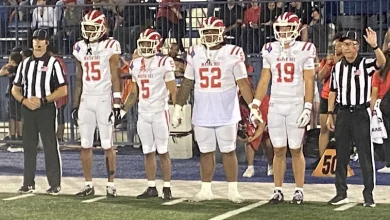Trends-US
Top 10 Julia Garner Movies and TV Shows Ranked

Julia Garner has become a significant figure in contemporary film and television. Notable for her role in the Netflix series “Ozark,” her performance as Ruth Langmore garnered critical acclaim and three Primetime Emmy Awards. As she continues to shine, let’s explore the top 10 Julia Garner movies and TV shows ranked by their impact and viewer reception.
Top 10 Julia Garner Movies and TV Shows Ranked
10. Sin City: A Dame to Kill For (2014)
- Genre: Crime Anthology
- Director: Robert Rodriguez, Frank Miller
- Role: Marcie, a supporting character in a stylistic and violent narrative.
- Summary: Garner plays a waitress caught in a high-stakes casino plot.
9. Apartment 7A (2024)
- Genre: Psychological Horror
- Director: Not specified
- Role: Terry Gionoffrio, a troubled character with a tragic past.
- Summary: A prequel to “Rosemary’s Baby,” it follows Terry’s descent into despair after moving into an unsettling apartment.
8. Wolf Man (2025)
- Genre: Horror
- Director: Leigh Whannell
- Role: A young mother in a modern twist on the classic werewolf myth.
- Summary: The film explores themes of illness and isolation as a transformation unfolds.
7. Inventing Anna (2022)
- Genre: Drama
- Network: Netflix
- Role: Anna Delvey, a real-life con artist.
- Summary: The story chronicles Anna’s manipulative antics in New York’s elite circles.
6. The Fantastic Four: First Steps (2025)
- Genre: Superhero
- Director: Matt Shakman
- Role: Shalla Bal, also known as the Silver Surfer.
- Summary: Garner’s character showcases significant depth in this revitalized Marvel movie.
5. Grandma (2015)
- Genre: Indie Dramedy
- Director: Paul Weitz
- Role: Sage, a granddaughter seeking financial support from her estranged grandmother.
- Summary: The film navigates familial relationships and generational differences alongside humor and pathos.
4. The Royal Hotel (2023)
- Genre: Psychological Thriller
- Director: Kitty Green
- Role: Hanna, an American navigating the dangers of working in a remote bar.
- Summary: The film explores vulnerability and fear in a seemingly mundane setting.
3. The Assistant (2019)
- Genre: Drama
- Director: Kitty Green
- Role: Jane, a junior assistant in a toxic work environment.
- Summary: The film portrays the quiet struggles and exploitation faced by young women in the workplace.
2. Ozark (2017-2022)
- Genre: Crime Drama
- Network: Netflix
- Role: Ruth Langmore, a local criminal with a complex backstory.
- Summary: Garner’s performance helped to elevate the series into a hallmark of Netflix originals.
1. Weapons (2025)
- Genre: Horror-Comedy
- Director: Zach Cregger
- Role: Juliette Gandy, an elementary school teacher tangled in a mystery.
- Summary: The film balances humor and tension, making it a standout in Garner’s career.
Through a range of characters, Julia Garner demonstrates versatility and depth in each role. From thrillers to dramas, her performances continue to captivate audiences and critics alike.





